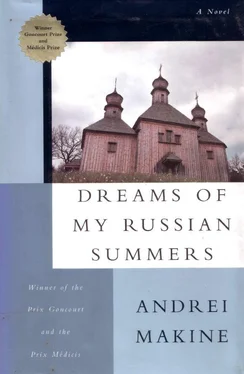They did not have time to go to sleep again. The first bombs tore the night apart. The squadrons, which had already been flying over the town for an hour, had as their target regions farther on into the depths of the country, where their assault might have the appearance of an earthquake. It was only toward half past three in the morning that the Germans began to bombard the line of the frontier, clearing the way for their land army. And that sleepy girl, my mother, fascinated by those strange, too well ordered constellations, had found herself in fact in a lightning parenthesis between peace and war.
It was already almost impossible to leave the house. The earth heaved; tiles, one row after another, slid from the roof and smashed with a dry crack on the front steps. The sound of explosions smothered gestures and words in a deafening blanket.
Charlotte finally managed to push the children outside and went out herself, carrying a big suitcase that weighed heavily on her arm. The apartment blocks opposite had no windows left. A curtain was billowing in the wind that had only just arisen. The movement of the pale fabric still had all the lightness of peacetime mornings.
The street that led to the railway station was strewn with shattered glass and broken branches. Sometimes a tree snapped in two barred the way. At one moment they had to skirt an enormous crater. It was at this point that the crowd of refugees became more dense. As they moved away from the hole, the people laden with bags started to push and suddenly noticed one another. They tried to talk, but the blast, lost among the houses, erupted all at once and gagged them with a deafening echo. They waved their arms helplessly and began running again.
When Charlotte saw the station at the end of the road, she could physically feel the life of yesterday slipping away into a past from which there was no return. Only the front wall was still standing, and through the empty sockets of the windows the pale morning sky could be seen…
The message passed along by hundreds of mouths finally penetrated the noise of the bombs. The last train for the east had just left, observing the usual timetable with an absurd precision. The crowd came up against the ruins of the station, stood still; then, crushed by the howling of a plane, scattered into the neighboring streets and under the trees of a public square.
Charlotte, disconcerted, gazed about her. A placard lay at her feet: "Danger! Do not cross the track!" But the track, torn up by explosions, now consisted only of crazed rails, thrown up in a taut curve against the concrete pillar of a viaduct. They pointed toward the sky, and the sleepers seemed like a staircase in a dream that led straight up into the clouds. "Over there. There's a freight train just about to leave." She heard the murmur of her son's calm and almost bored-sounding voice.
In the distance she saw a train of great brown freight cars around which little human figures were busily moving. Charlotte seized the handle of her suitcase, the children grabbed their bags.
As they arrived beside the last car, the train started, and a fearful sigh of joy could be heard greeting its departure. A compact bunch of frightened people were visible between the sliding walls. Charlotte, aware of the desperate slowness of her movements, pushed her children toward this opening that was slowly moving off. The son climbed on board and grabbed the suitcase. Already his sister had to quicken her pace to grasp hold of the boy's hand, which he held out to her. Charlotte seized the child by the waist, lifted her, and managed to heave her on board the crowded car. Now she had to run, while trying to clutch hold of the great iron latch. It only lasted for a second, but she had time to glimpse the petrified faces of the survivors, her daughter's tears, and with a supernatural clarity, the cracked wood of the wall of the car…
She stumbled, fell to her knees. The rest was so swift that she could not believe she had touched the white gravel of the embankment. Two hands squeezed her sides hard, the sky described an abrupt zigzag, and she felt herself propelled into the car. And in a luminous flash she glimpsed the cap of a railwayman, the silhouette of a man profiled for a fraction of a second against the light between the open partitions…
Toward midday the train passed through Minsk. In the thick smoke the sun shone as red as that of another planet. And strange funereal butterflies – great flakes of ash – fluttered in the air. No one could comprehend how in a few hours of war the city could have been transformed into those rows of blackened carcasses.
The train advanced slowly, as if feeling its way, in this carbonized twilight, under a sun that no longer hurt the eyes. They had already become accustomed to this hesitant progress and to the sky filled with the roaring of planes. And even to the strident whistling sound above the freight car, followed by a hail of bullets on the roof.
As they were leaving the charred city, they came upon the remains of a train gutted by bombs. Several carriages were overturned on the embankment. Others lay on their sides or were embedded in one another in a monstrous telescoping, blocking the track. Several nurses, sunk into stunned helplessness at the number of bodies lying there, were walking the length of the train. Within its black entrails one could see human shapes; sometimes an arm hung from a broken window. The ground was covered with scattered luggage. What was most surprising was the number of dolls lying on the sleepers and in the grass… One of the carriages still left on the rails retained its enamel plaque, on which the destination could be read. Perplexed, Charlotte realized that it was the train they had missed that morning. Yes, that last train for the east, which had observed the prewar timetable.
At nightfall the train accelerated. Charlotte felt her daughter snuggling against her shoulder and shivering. She got up to free the big suitcase on which they were sitting. She must make ready for the night, take out warm clothes and two bags of biscuits. Charlotte half opened the lid, thrust her hand into the case, and froze, unable to stifle a brief cry, which woke their neighbors.
The suitcase was full of old newspapers! In the panic of that morning she had brought the Siberian suitcase…
Still unable to believe her eyes, she drew out a yellowed page and by the gray light of dusk managed to read, "Deputies and senators, irrespective of faction, had responded with enthusiasm to the summons addressed to them by Messieurs Loubert and Brisson… The representatives of the great bodies of the state were gathered in the Salon Murat…"
With a sleepwalker's gesture Charlotte closed the case again, sat down, and looked about her, gently shaking her head, as if she wanted to deny an indisputable fact.
"I have an old jacket in my bag. And I picked up the bread from the kitchen as well, when we were leaving…"
She recognized her son's voice. He must have sensed her feeling of helplessness.
That night Charlotte slept long enough to have a rapid dream, a mixture of sounds and colors from the old days… Somebody slipping along toward the exit woke her. The train had stopped in the middle of fields. The night air did not have the same black density here as in the town they had fled. The plain stretching out beyond the pale rectangle of the open door held the ash-gray tint of the nights of the north. When her eyes had mastered the darkness, she could make out the shape of a sleeping izba beside the track, in the shadow of a copse. And in front of it, in a meadow that bordered on the embankment, she saw a horse. The silence was such that one could hear the light crunching of stems being torn up and the soft tread of hooves on the damp ground. With a bitter serenity that astonished even her, Charlotte sensed a clear thought taking shape and echoing through her mind: "Earlier there was that hell of the burned-out towns: a few hours later – this horse, browsing on the dew-laden grass in the cool of the night. This country is too big for them to conquer. The silence of this boundless plain will resist their bombs…"
Читать дальше












